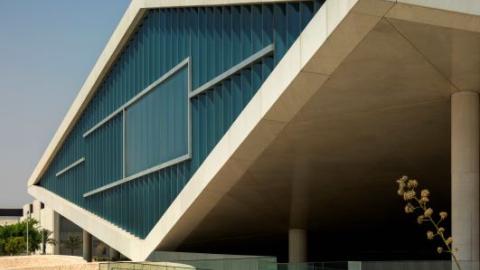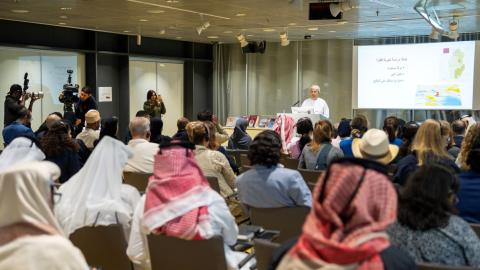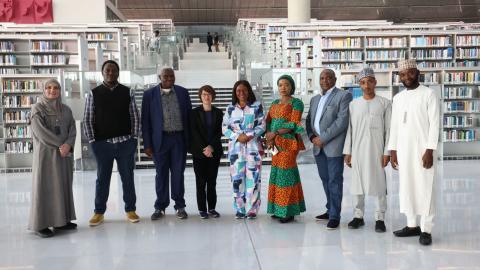
Qatar National Library’s first anniversary lecture took place today, with the crucial relationship between cultural heritage and human rights as its main subject. The lecture considered the role heritage plays in maintaining the identity, history and cultural legacy of communities in the Arab region.
The event was opened by Dr. Sohair Wastawy, Executive Director of the Library, followed by His Excellency Dr. Hamad Bin Abdulaziz Al-Kawari, State Minister, who talked about the efforts that Qatar has been making to support the preservation of, and access to cultural heritage. Dr. Al-Kawari also highlighted the role that cultural heritage plays in Qatar National Vision 2030 and its relationship to national identity in Qatar and human rights.
“The State of Qatar, under the leadership of His Highness the Amir Sheikh Tamim bin Hamad Al Thani gives cultural heritage its utmost attention, and regards it as a cornerstone of cultural efforts in line with our National Vision 2030. Our cultural institutions, including Qatar National Library and Qatar Museums, are working day and night in cooperation with regional and international organizations to preserve heritage and strengthen its status,” said His Excellency Dr. Al-Kawari. “Let’s work together to increase the belief of young generations in our cultural heritage. We count on the Library to be a bridge to exchange and share understanding of cultural heritage.”
The keynote speech was delivered by Her Royal Highness Princess Dana Firas, UNESCO Global Ambassador and President of the Petra National Trust, who discussed the protection of heritage sites in conflict zones.
“We are blessed in our region with innumerable natural and cultural treasures and an exceptionally rich heritage. All around us today, in this incredible setting, we see, smell and experience the documentary evidence of thousands of years of human history and relations. This stands as tangible evidence of our region’s role as a wellspring of culture and science, an epicenter of connectivity among peoples and a cultural, historic, religious and economic crossroads for thousands of years,” said Her Royal Highness Princess Dana.
“One challenge that many World Heritage sites face today is badly managed tourism and the over exploitation of cultural and natural heritage. Tourism has the potential to reach communities long forgotten by mainstream development and business ventures; it can continue to prosper even in the face of financial crises and economic slowdowns; it can provide jobs when most needed, and if harnessed properly it can contribute to conserving nature and preserving historic sites and cultural traditions.”
Dr. Julia Gonnella, Director of the Museum of Islamic Art and Dr. Wastawy participated in the panel alongside Her Royal Highness. The panel was moderated by Dr. Susan Karamanian, Dean of the College of Law and Public Policy at Hamad Bin Khalifa University.
“Cultural heritage is more than just books in a library or items in a museum; it is a fundamental human rights issue, one that is closely tied to our sense of self, our sense of dignity as people. Libraries are memory institutions, and preserve the history and heritage of nations. Like other libraries, we are leveraging trends such as modernization and globalization to better preserve and share cultural heritage. We are digitizing items from our Heritage Library collection and making them available online, meaning that anyone, anywhere, can learn more about Qatar’s cultural legacy. We’re also partnering with libraries internationally to digitize and virtually repatriate millions of pages of cultural and historical information about Qatar and the region,” said Dr. Wastawy.







